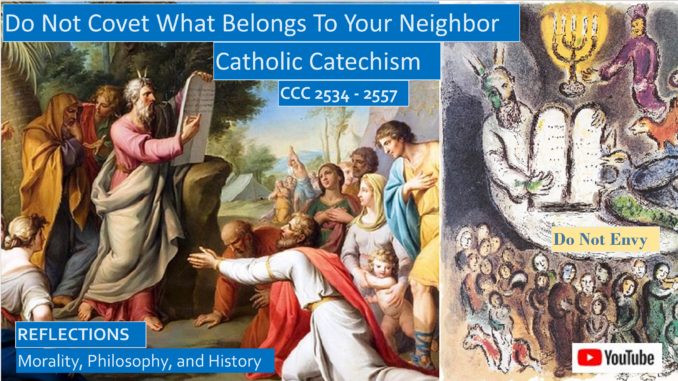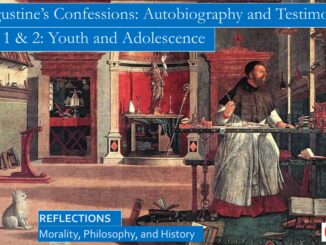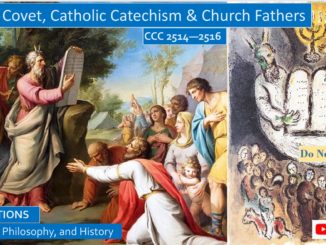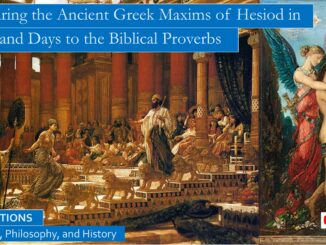
The Catholic Catechetical tradition splits the command, Thou Shalt Not Covet, into a commandment against coveting your neighbor’s wife, concupiscence, and a commandment against coveting your neighbor’s possessions. To emphasize the evils of coveting, the commandment lists the possessions most treasured in ancient Israel, “Neither shall you desire your neighbor’s house, or field, or male or female slave, or ox, or donkey, or anything that belongs to your neighbor.”[1]
The Catholic Catechism warns that coveting, or avarice, “is the root of theft, robbery, and fraud.” Both avarice and fornication are both sins of idolatry, when we stray from the love of our neighbor, we stray from the Love of our God, Love of God and love of neighbor are like two vines that twist around the same branch. Coveting “concerns the intentions of the heart, and summarizes all the precepts of the Law.” The commandment against coveting forbids the greed that gathers up earthly goods without limit, and the “avarice arising from the passion for riches.” “For where your treasure is, there your heart will be also.”[2]
Please read our other blogs on the Catholic Catechism on DO NOT ENVY:
Catholic Catechism, Do Not Covet, CCC 2514-2516: https://wp.me/pachSU-e1
Catholic Catechism, Do Not Envy, Purification of the Heart, CCC 2517-2533, https://wp.me/pachSU-eb
Catholic Catechism, Thou Shalt Not Covet thy Neighbors Possessions, CCC 2541-2557, https://wp.me/pachSU-fx
Please view our YouTube Videos on DO NOT ENVY your neighbor’s wife: https://youtu.be/vhte2s1ITNU and https://youtu.be/v_BmOU1VcHQ
Please view our YouTube Video on DO NOT ENVY your neighbor’s possessions: https://youtu.be/8QHrtKGDzKM
YouTube script for DO NOT ENVY your neighbor’s possessions, with book links: https://www.slideshare.net/BruceStrom1/catholic-catechism-ccc-25332555-do-not-covet-your-neighbors-prized-possessions
CATHOLIC CATECHISM, DO NOT COVET, SECTIONS 2534-2540[3]
Read the Catholic Catechism For Free on US Bishops website
http://www.usccb.org/beliefs-and-teachings/what-we-believe/catechism/catechism-of-the-catholic-church/
The Catholic Catechism reminds us King David’s sin with Bathsheba, the beautiful Bathsheba whom we spied bathing from his rooftop, the Bathsheba, mother of Solomon, whom he sent for so he might lie with her when her husband Uriah was away fighting his war, the Bathsheba whose husband Uriah was murdered by King David and his general, the Bathsheba whom he married once he murdered her husband, the sin King David strove so hard to hide.
But nobody can hide their sins from the Almighty God, and “the Lord sent Nathan to David. He came to him, and said to him, “There were two men in a certain city, the one rich and the other poor. The rich man had very many flocks and herds; but the poor man had nothing but one little ewe lamb, which he had bought. He brought it up, and it grew up with him and with his children; it used to eat of his meager fare, and drink from his cup, and lie in his bosom, and it was like a daughter to him. Now there came a traveler to the rich man, and he was loath to take one of his own flock or herd to prepare for the wayfarer who had come to him, but he took the poor man’s lamb, and prepared that for the guest who had come to him.”
Then David’s anger was greatly kindled against the man. He said to Nathan, “As the Lord lives, the man who has done this deserves to die; he shall restore the lamb fourfold, because he did this thing, and because he had no pity.”
Nathan said to David, “You are the man!”[4]
Nathan risked his life in calling out King David, for David need only say the word and Nathan would be executed. But King David did what most great sinners do not, he repented, and we hear in Psalm 51, the Psalm of Repentance, how when we sin against our neighbor we also sin against God, how
“Against you, God, you alone, have I sinned,
and done what is evil in your sight,
so that you are justified in your sentence
and blameless when you pass judgment.”[5]
The Catechism also references the story where King Ahab covets Naboth’s vineyard. “His wife Jezebel came to him and said, “Why are you so depressed that you will not eat?” He said to her, “Because I spoke to Naboth the Jezreelite and said to him, ‘Give me your vineyard for money; or else, if you prefer, I will give you another vineyard for it’; but he answered, ‘I will not give you my vineyard.’” 7 His wife Jezebel said to him, “Do you now govern Israel? Get up, eat some food, and be cheerful; I will give you the vineyard of Naboth the Jezreelite.”
But Israel is not the godless land that Jezebel’s home of Sidon, Israel was governed by the Law of Moses, she couldn’t simply execute Naboth, she needed to also break another commandment, she needed to frame him with a false accusation. For this crime the Lord and Elijah cursed both Ahab and Jezebel, the dogs would like up the blood of Ahab, while the dogs will completely consume the body of Jezebel. We encourage you to read this account in Scriptures, it is fascinating.[6]
ST JOHN CHRYSOSTOM’S COMMENTARY ON 2 CORINTHIANS
The Catechism references a commentary by St John Chrysostom on this verse in 2 Corinthians: “I will very gladly spend and be spent for your souls; though the more abundantly I love you, the less I am loved.”[7]
What does this verse have to do with envy? Our saint comes to envy from some digression, as many in-depth commentaries view all of Scripture through the lens of the verse they are studying. This is a verse about the selfless shepherd who is unappreciated by sheep, or perhaps the mother or fathers whose children do not respect them, or perhaps St Paul is telling us he tries to emulate Christ, who was crucified by those He was sent to save. St John Chrysostom asks, “who would be so vile to be like a wild beast, to turn away from and hate him who loves him?”
How many of us truly Love God with all of our hearts and with all of souls and with all of our minds? Do we strive to pray without ceasing? If we do not truly Love God we do not truly love our neighbor, so it is not a big step between this verse about the man who does not value love or morals to the “man who does and says everything to pull his neighbor down.”
When we do not Love God, when we do not love our neighbor, when we instead we hate our neighbor, coveting his possessions, we become “annoyed at the goodness of our neighbors, like mad and rabid dogs,” “exasperated by envy. It is better to have a serpent twining about our intestines than to have envy crawling about in us.” “Envy devours the soul.”
“This distemper has infected even the Church, it has turned everything topsy-turvy, we fight each other, and envy arms us one against the other.” He compares envy to a worm that destroys the root of the Church so eventually it topples over. The many faithful whose “faith is not active have quenched the warmth of the Church and have made the body of Christ a corpse.” Although we are brothers we behave like enemies, “we are divided against each other like wild beasts.” Rather than seeking to find fault with our brothers we should seek to praise them. “Let us banish ill will and envy, let us instead embrace love and concord.”[8]
Church history since St John Chrysostom shows how the worm eating at the roots of the Church has caused much strife and many divisions. Many disputes that are reputedly about belief are really about envy. We can tell because history records that these disputes often involve the seizing of property of heretics and unbelievers and often Church property. When the Jew were expelled from Spain in the Reconquista their property was seized, and the Protestant Reformation and the French Revolution caused Church properties to be seized. Indeed, many Protestant nobles and kings were unwilling to come back to the Catholic Church for fear they would need to return Church property.
ST AUGUSTINE AND ST GREGORY ON ENVY
The Catechism references St Augustine’s work on “Catechizing the Uninstructed.” Envy is the “diabolical sin,” envy is a mortal sin, envy makes us sad to witness the prosperity of our neighbor, envy causes us to wish “grave harm on our neighbor.”
St Augustine teaches us “that nothing is more opposed to love than envy, and the mother of envy is pride.” The remedy for the pride that leads us to love-destroying envy is our Lord Jesus Christ, who as both God and man is “both a manifestation of divine Love towards us and an example of human humility living with us,” a great misery of proud men cured by a greater mercy, a humble God![9]
Read our blog on St Augustine’s work, “Catechizing the Uninstructed.”
The Catholic Catechism also references the Moralia of Job by St Gregory the Great, who teaches that “when pride, the queen of sins, has fully possessed a conquered heart, she surrenders it immediately to seven principal vices, as if to some of her generals, to lay it waste.” These vices are similar to the vices described by the Eastern Church Fathers and St John Climacus of the Ladder, they are “vain glory, envy, anger, melancholy, avarice, gluttony, and lust.” The vices are linked to one another, “the first offspring of pride is vain glory, and this, when it has corrupted the oppressed mind, begets envy.” And “from envy springs hatred, whispering, detraction, exultation at the misfortunes of a neighbor, and affliction at his prosperity.” “Envy also generates anger,” envy stirs up the cauldrons of our soul, envy leads to avarice, envy leads to melancholy, envy leads to sinful despair, envy leads us to sin every other sin.[10]
ST JOHN CHRYSOSTOM ON ROMANS
The Catholic Catechism teaches that envy is a type of sadness, refusing charity, and is best overcome by free will. St John Chrysostom is quoted:
“Would you like to see God glorified by you? Then rejoice in your brother’s progress and you will immediately give glory to God. Because his servant could conquer envy by rejoicing in the merits of others, God will be praised.”
The footnote credits this to St John’s Chrysostom Homily 71 on Romans, but this is a clerical error, as there are only 32 Homilies on Romans. A text search on these homilies[11] suggests that this is a conflated quote probably from Homily 7 of the Romans, which comments on this verse in Romans,
“Do we then overthrow the law by this faith? By no means! On the contrary, we uphold the law.”[12]
So how does this verse relate to envy? Because the Gospel upholds the law by faith, with love, Loving God, loving our neighbor. St John Chrysostom teaches, “envying is worse than fighting, when the fight is over so is the hatred, the grudger would never become a friend.”
St John Chrysostom closes his homily with the wish that we should scorn money so Christ will not scorn us. But if we distribute our wealth abundantly, we will be spiritually wealthy both on heaven and on earth. “He that would become rich, let him become poor, so that he may be rich. Let him spend that he may collect, let him scatter that he may gather.”[13]
GUARDING AGAINST ENVY
The Catholic Catechism teaches that “it is not a violation of this commandment to desire to obtain things that belong to one’s neighbor, provided this is done by just means,” which means we should never seek to harm our neighbor, or impoverish him, or take advantage of him in a business deal.[14]
Luther in the Lutheran Large Catechism is more specific, “We are forbidden to entice anything away from our neighbor, even though in the eyes of the world you could do so honorably, without accusation or blame for fraudulent dealing.” Later Luther also says, “God does not want you to deprive your neighbor of anything that is his, letting him suffer loss while you gratify your greed, even though in the eyes of the world you might honorably retain the property.”
Luther explains that covetousness may lead us to file lawsuits against our neighbor, seeking damages, disputing inheritances, or simply to squeeze something out of our neighbor, or bribing public officials to give him title to a desired property. Covetousness may lead us to take advantage of our neighbor’s adversity or debt, picking up his property for less than its fair value.
Christians are not forbidden to hire attorneys to safeguard their interests, particularly if they need to protect their ability to provide for their families and fund their charities, but Christians are forbidden to hire attorneys who are sharks, who have the reputation of relentlessly pursuing their prey regardless of who is in the right, regardless of whom they manage to destroy.
“God wants our hearts to be pure, even though as long as we live here we cannot reach that ideal.”[15]
[1] https://www.biblegateway.com/passage/?search=Deuteronomy+5%3A21&version=NRSVCE
[2] https://www.biblegateway.com/passage/?search=matthew+6%3A21&version=NRSVCE
[3] http://ccc.usccb.org/flipbooks/catechism/index.html#606
[4] https://www.biblegateway.com/passage/?search=2+samuel+12%3A1-7&version=NRSVCE
[5] https://www.biblegateway.com/passage/?search=psalm+51%3A4&version=NRSVCE
[6] https://www.biblegateway.com/passage/?search=1+kings+21%3A1-29&version=NRSVCE
[7] https://www.biblegateway.com/passage/?search=2+Corinthians+12%3A15&version=NKJV For this verse the New Kings James translation is closer to the translation St John Chrysostom is using.
[8] St John Chrysostom, “Homilies on Second Corinthians,” In the Nicene and Post-Nicene Fathers, First Series, Volume 12, translated by Rev Talbot Chambers (Boston: Hendrickson Publishers, 1994, first published 1889), Homily XXVII, Chapters 2-4, pp. 405-407.
[9] St Augustine, “On the Catechizing of the Uninstructed,” In the Nicene and Post-Nicene Fathers, Volume 3, translated by Rev SDF Salmond (Boston: Hendrickson Publishers, 1994, first published 1887), p. 283-299.
[10] http://www.lectionarycentral.com/GregoryMoralia/Book31.html Section xlv, Chapters 87-90.
[11] http://www.documentacatholicaomnia.eu/03d/0345-0407,_Iohannes_Chrysostomus,_Homilies_on_The_Epistle_To_The_Romans,_EN.pdf
[12] https://www.biblegateway.com/passage/?search=romans+3%3A31&version=NRSVCE
[13] St John Chrysostom, “Homilies on Romans,” In the Nicene and Post-Nicene Fathers, First Series, Volume 11, translated by Rev JB Morris (Boston: Hendrickson Publishers, 1994, first published 1889), Homily VII, pp. 380-385.
[14] Catechism of the Catholic Church, 2nd Edition (Washington DC: US Catholic Conference: 1994), pp. 607-608, paragraphs 2534-2540.
[15] Martin Luther, Ten Commandments, Large Catechism, in the Book of Concord (Philadelphia: Fortress Press, 1959), pp. 404-407. The Large Catechism is also readily available separately.




2 Trackbacks / Pingbacks